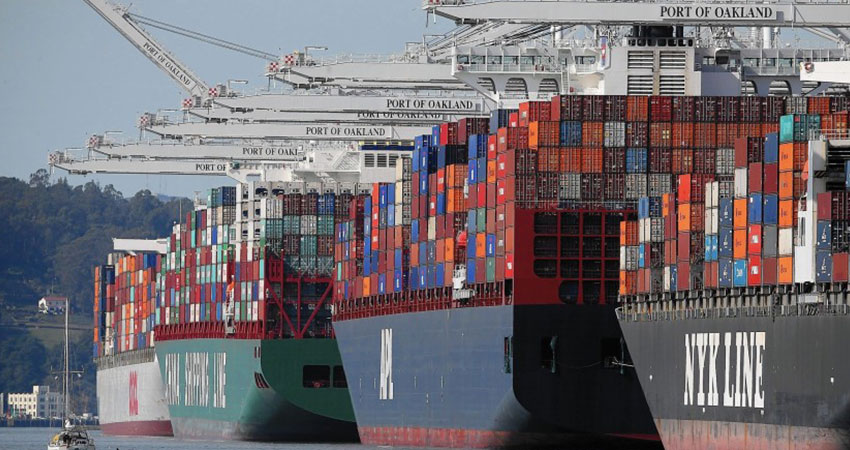Congestion at the Port of Oakland (photo credit: LA Times)
Update: as of today (March 29, 2021), the Ever Given has been successfully re-floated after six days through a combination of dredging and towing, allowing ocean freighter traffic to resume through the Suez Canal, including the 320 waiting vessels on either side.
As container ships continue to pile up at the blocked Suez Canal for a third day, an already serious issue of port congestion has grown worse, rippling down to longer delays on consumer orders as inventories deplete with goods hung up in transit.
Even before the Japanese cargo ship Ever Given got stuck in the Suez on Tuesday, various ports, especially Los Angeles and Long Beach but also Oakland and Seattle/Tacoma, as well as East coast sites like Savannah and Charleston, were experiencing congestion issues. Experts predict it could be months before the boondoggle is freed up.
Efforts to dislodge the Ever Given, including dredging, tugs and even a backhoe, have thus far failed, with 150 vessels backed up and hundreds more on the way, AP reports.
“We’re advising (shipper clients), be as strategic as you can,” said Perry Falk, SVP of carrier operations for Nolan Transportation Group. “As best you can, plan ahead, knowing delays exist. All indications are (congestion and delays) will likely persist through the summer which, the way things are going, I guess will trickle into Q3. It’s taking longer for ripples to calm themselves down.”
Even after massive port congestion at LA/Long Beach eased up, going back to pre-Christmas levels a couple weeks ago – following a record February that saw a 47% increase in container traffic – issues started cropping up elsewhere, including fog leading to delays in Savannah, then the current Suez logjam. And experts say LA/Long Beach congestion could easily spike up again in the near future.
All of this has been compounded by labor shortages as hundreds of longshoremen at the ports have been out of work due to COVID-19 infection. This same issue has hit the ecommerce fulfillment leg of the retail supply chain, with the double whammy of labor shortage and booming demand leading to greater use of automation solutions.
Brad McBride, founder and CEO of Zero Down Supply Chain Solutions, said shipper clients have been trying to divert their freight to different ports from the West coast, only to find issues on the East coast. They’re also getting hit with mounting detention and demurrage (D&D) charges by the shipping lines when containers or the chassis that dray them from the port are not returned in the allotted five days, through no fault of their own.
“The additional charges become a domino effect, and clients are taking rate increases,” McBride said. “The majority of my clients are looking to go out to bid on freight, with the thought of getting better terms, the lowest of the highest.”
Many shippers he works with have been upgrading from ground to express service with carriers to counteract some of the slowdown caused by the port delays, which gets expensive fast. Shippers have even been flying goods out of China instead of putting them on a ship. “It’s a Catch-22,” McBride said. “Companies are working harder and longer and making less in a lot of instances. They’re doing all they can just to maintain customer loyalty.”
Jonathan Gold, VP of supply chain and customs policy for the National Retail Federation, said the D&D charges are supposed to act as incentive for the equipment to be returned as fast as possible, but the current port congestion situation is making that next to impossible.
“The issuing of those charges needs to be to reassessed,” Gold said. “Retail shippers need to have a conversation with their partners to work through (the charges). The Federal Maritime Commission is looking into it, and Congress is starting to pay attention to it as well, on the export side but also looking at import issues.”
Falk said some of his shipper customers are eating the cost of expedited express shipping, while some manufacturers are stopping production and retailers are “just flat sold out” of some in-demand items.
“Anecdotally, you see long delays with home-based goods like gym equipment with three to four-month delays,” Falk said. “Or if you’re doing a home remodel and trying to get a door or something specialized, if it’s not domestically produced, you’re in trouble. The rapid change in consumer spending this time last year as pandemic took hold meant spending stayed relatively flat, but the makeup of that spend shifted dramatically, from services and travel to consumer goods.”

